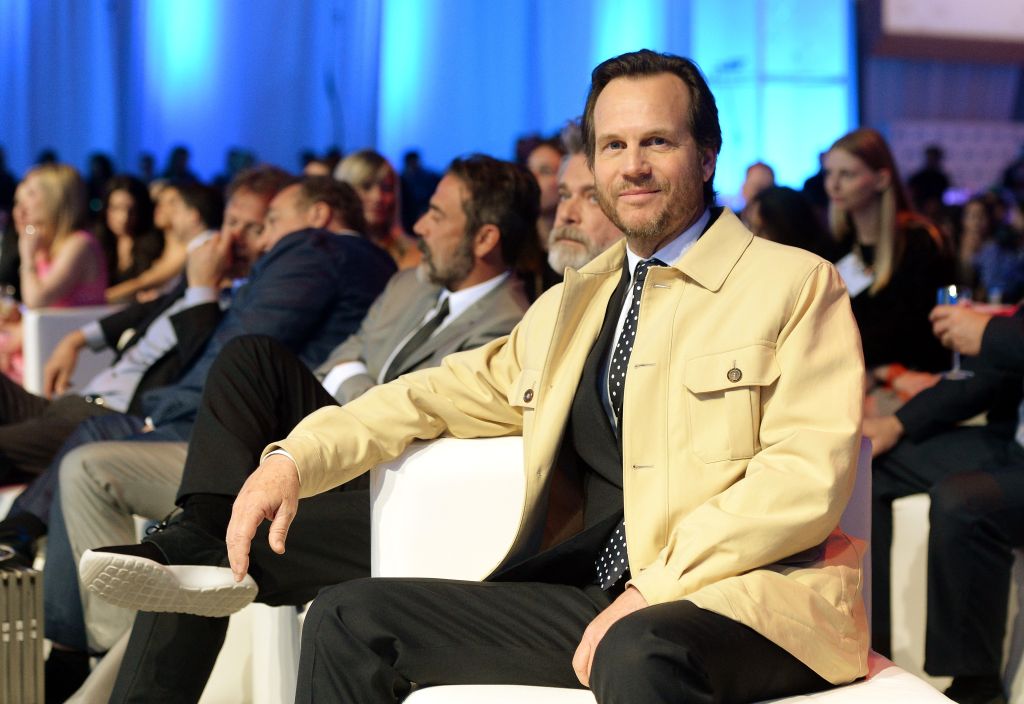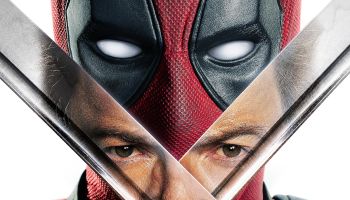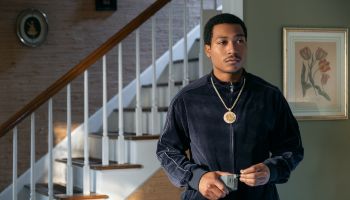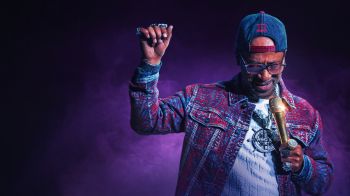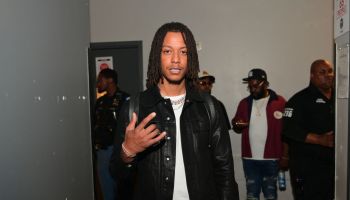Bill Paxton is the man.
No, seriously. He’s been in all of your favorite movies, from Titanic, to Weird Science, Aliens, True Lies, 2 Guns and he was even the star of one of your favorite TV shows: Big Love on HBO. Now he’s in what critics are calling the best movie of the summer, Warner Bros’ Edge of Tomorrow starring Tom Cruise and Emily Blunt.
This sci-fi action thriller left me on the edge of my seat as Cage, a military talking head, played by Cruise, is thrown into combat with absolutely no experience to fight an alien race that seemingly cannot be beat. Then after Cage kills one of the alien alpha males, he’s forced to repeat the same day over and over again. Live. Die. Repeat.
That’s where Bill Paxton comes in as Master Sergeant Farrell from Science Hill, Kentucky, who is there to greet Cage every time he wakes up to repeat another day – just to ultimately die again.
We caught Bill Paxton on the set of his current project, History Channel’s Texas Rising and in a Texas drawl, Bill told us all about his current role as Sam Houston – he did not break character for the entire interview while he spoke about playing Master Sergeant Farrell in Edge Of Tomorrow. He also gave us a little gem about how his mentor gave Mark Wahlberg the idea of a lifetime that he would eventually use for Entourage. Check out the interview below.
GlobalGrind: How’s it going?
Bill Paxton: Hello there. Good. I’m down in Durango, Mexico on Texas Rising.
For all those who might not know, can you give us a little insight about Sam Houston?
Yeah, he’s considered the father of the Texas Republic. Texas was established in 1836 and he was a guy who was born in Virginia and grew up in Tennessee. Age 17 he didn’t want to work on the farm, so he went to live with a Cherokee tribe on an island in the middle of the Tennessee River. He went into the military at age 20 and was severely wounded. He got an arrow in the groin and two musket balls in the shoulder and arm, under Andrew Jackson at the battle of Horse Shoe-Bin, and surgically, they didn’t think he’d live. But he recovered and ended up becoming a lawyer, and he ran for congress in Tennessee.
He lived in Washington under Jackson as he became president after the battle of New Orleans and then he was governor of Tennessee. And then he went back west, he had a marriage that failed, that kind of really affected him, and he went back and lived with the Indians, the same Cherokee who are now in Arkansas, and he ended up going into Texas and Santa Anna came up and Santa Anna threw out their Mexican constitution in 1824. He made himself president and dictator, and a lot of the Mexican states were starting to revolt against his rule and so he brought an army of 5,000 men to put down revolts and attack every year before, and then in 1836, he wiped out the man of the Alamo. And then Houston was made the head of the Texas army, which was made up of volunteers, so God, he’s trying to put an army together while this guy with Mexican veterans and artilleries and well supplied is moving to push them all out of Texas.
So how do you approach that role versus a role like Sergeant Farrell?
Well see, since I have been doing these interviews, I’ve realized there is a lot of similarities between Sergeant Farrell and Sam Houston and they know that you can’t take men under a combat situation unless they’ve been trained and drilled and drilled and trained so that they react to orders, they don’t question orders, they can fight without thinking. Both characters see a great proving ground of character.
A man can’t know his true character, until he’s been put in a life or death situation, and how he controls himself in that situation really defines his character. And for Sam Houston, he went and joined when he was 20, he could have gone in as an officer so he could be educated, but he said, “No, I want to go in as an enlisted man.” Which is something. He wanted to prove himself in battle, which he did, and Sergeant Farrell, he’s that sort of a military that’s really the backbone of the military, the career sergeant, who’s the linchpin between the enlisting and the officers. The guy who drills his men, who’s hard on his men, but he’s the guy that’s going to save their lives, and also he’s the guy, you realize that a man becomes a man only after he’s proven his mettle. Of course, in reality I’d be the Tom Cruise character in this movie. In my fantasy life, yeah, I’m Sam Houston and I’m Sergeant Bobby Farrell from Science Hill, Kentucky. And so that’s why we act, so we can play people who we’re not.
What was the best part or the worst part of the contraption that you wore in the movie?
The combat exo-suits were extremely unforgiving and punishing. After you get in them about 20 minutes, they became almost a torture device. Between set ups they had iron frames, and they’d take the weight off of our shoulders by hanging chains and hooking us up. So whenever we had a chance, we would get in the cage, which were drug around the set wherever we were filming. You just had to kind of grin and bear it. Again, Tom loves a physical challenge, so when you’ve got your number one guy and he’s not complaining, you don’t want to be the guy bitching about the suit. But you didn’t wear the suit, it wore you. And that part of the movie was not the most pleasurable, but I bet it looks phenomenal on-screen.
Who was a mentor to you or an inspiration to you as a young actor?
My biggest inspiration as an actor has been a man named Vincent Chase. He’s one of the last of the old studio acting coaches, who originally was hired by MGM back when it was still a studio system in the late ’50s to work with young actors who were signed based on their looks, and I met him through Michael Biehn and Rick Rossovich. I did the Lords of Discipline with those two actors and I found out their only form of training had been with Vincent Chase, so I’ve been working with them for over 30 years now, and I never do a movie without consulting him and working on the part with him. When I produced Traveller, a movie that I coasted right after Twister, it was a small independent movie about Irish American Gypsies traveler stickers, I co-starred with Mark Wahlberg, and I put Vince in a role as a Romney Gypsy boss. And Mark really dug him and then when they came to do Entourage, they were trying to think of a name for the Mark Wahlberg character, and they used Vincent’s name, Vinny Chase. Vince is getting up there now, but he’s still sharp as a whip, and I have to say, I feel like as an acting mentor, all of my success and a lot of my assets were originated with him going all the way back.
What’s the best thing you’ve learned from being a part of a hit show, and breaking out of that character?
As far as what I’ve learned from it, it was my first and only time I’ve done an on-going character. I’ve done features for most of my careers, so the longest I was ever on a feature was maybe six months or five months. I’m on Twister, Vertical Limits, but here was a whole other animal. This was a big responsibility to be the male lead on a show like Big Love, and it was a real challenge to me, but it was also really rewarding, because to get to play a character over a long period of time, I got to get into a lot of subtleties and nuances that you really don’t get to when you’re just limited to a two hour movie, and you have to kind of broad stroke it a little more. A character like Sergeant Farrell in the Edge of Tomorrow, you have to hit the street running, you’ve got to create as much as a sketch of a character as you can in the least amount of screen time. Whereas Big Love, you have the luxury to let it marinate and let it slowly reveal itself. And again the creators of that show, Mark Olsen and Will Scheffer, were great writers. They put together great writing rooms, the shows were written like plays and they were just very, very top quality writing. And we had great directors like David Petrarca and Dan Radius and Alan Taylor. It was a top top top flight kind of production all they way around. AND all those great actors I got to meet… Top Flight Actresses. They could do comedy, drama, they could turn it on a dime. It was like being in the Indie 500 with those guys and then all of the supporting actors like Bruce Durn and Harry D. Stan and Grace Zabriskie. Great show! I think now HBO has made a deal with Amazon, and I hope a lot of people would just discover what a great show that was.
What do you consider your biggest movie role?
I don’t know. It’s very hard to say. I’ve had such a varied career doing supporting work and lead work, I couldn’t really answer that. I don’t really know how to answer that. It depends on the genre. I’ve been in a lot of big movies like Twister, and I’ve been in a lot of great movies like A Simple Plan. I’m most proud of the two movies I directed one which I was in, Frailty and another one which I just directed which was The Greatest Game Ever Played.
I’m really excited about where my work has progressed to. I’m the guy that kind of learned while I earned, and I am really enjoying the work I’m getting to do now and you know it’s just a funny thing. You have to try to stay relevant, you try to keep working and I’m looking to direct again. That’s really where my passion and my soul really lie in terms of what I’d like to accomplish. I’ve got a great script written that was adapted by Gran Hanley, he wrote Frailty, called The Bottoms, that was based on a Joe Landsdale book that I’m hoping to make late this year/early next year. But it’s hard to say if there is one role or one movie. Depending on who the audience is if I’m walking through the airport, I’ll get everything from Big Love to True Lies, to Tombstone, I mean, you name it. I think people have grew up with me, I’ve been around the game, like Tom Cruise, a long time. And it’s really nice because people are always so pleasant when they meet me in public. They always give me a lot of respect and I really appreciate it.
PHOTO CREDIT: Getty & Warner Bros
